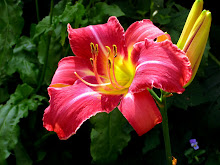
Here we are at the end of July, when normally there is still an abundance of daylilies in bloom. After talking with other gardeners and nursery growers, though, it’s clear that what I’m experiencing here is the norm in this region – most of the blooms have gone by already, and great swaths of the gardens are nothing but foliage.
There’s a friend who always goes away at the beginning of August, and cuts all her blooming daylilies first to bring them with her; she has none left to cut this year. Another gardener has pointed out that so many things are way ahead of schedule … goldenrods in bloom, an abundance of monarchs, the nesting of certain creatures, acorn drop. I can hear the insect sounds of late summer, and keep thinking that it’s the end of August, from the feel of things.
This leads, of course, to worried speculation about the coming winter, as if there’s some connection to be made. Maybe there is, but we mere mortals cannot divine it yet. That doesn’t stop us from fretting that it will be early and severe. Indeed, more extreme weather seems to be the norm these days, and certainly we’ve heard that same prediction for the future. The National Climatic Data Center says that June 2010 was the warmest since record-keeping began in 1880; both NOAA and NASA rate this year’s January-to-June as the warmest such period on record. And, of course, rainfall’s been in short supply this summer as well … not a banner year for gardens, that’s for sure.
Xeriscaping is the art and science of using drought-resistant plants in the landscape, and daylilies fill that bill, along with many of the other perennials we grow here. The vegetable beds have drip irrigation, which uses only 30% of the water of overhead sprinklers. The newly-planted fruit trees and bushes have needed supplemental watering all season, without established deep root structures. And the greenhouse, full of pepper and tomato plants, has needed hand watering every day during this long hot summer. Such a difference from the wet summer of 2009!


No comments:
Post a Comment